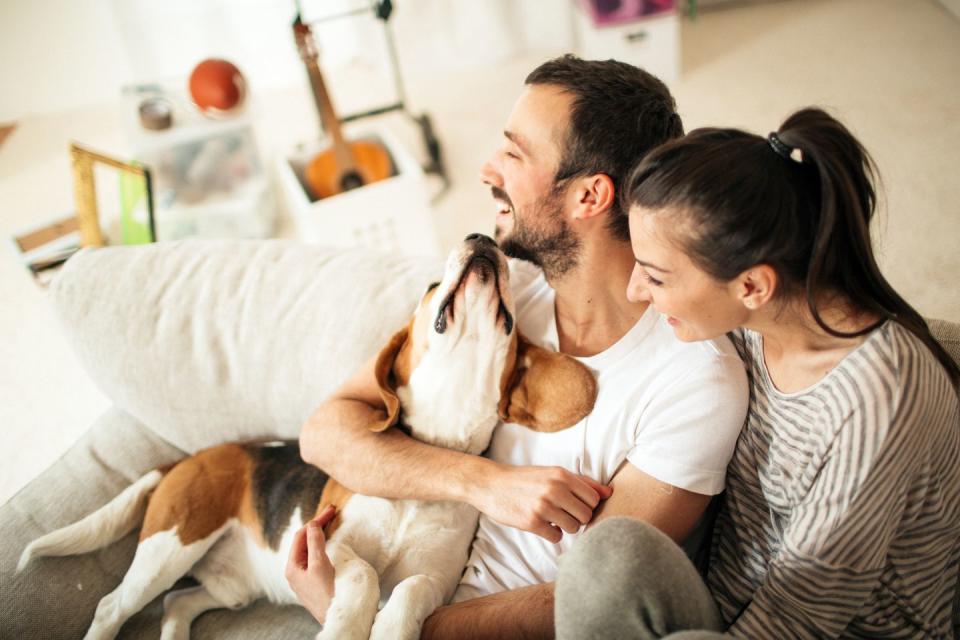Introverts Reveal What They Wish Their Partners Knew

If he weren’t so adorable, you might have missed him: He’s the guy who seems beyond fascinated by the painting on the wall of the party, and not that into the party itself. He doesn’t look unhappy to be there-more like, content to hang back, think deep thoughts, and swirl the ice around sexily in his almost-empty glass.
So you screw up your courage, amble over, park yourself next to him and make a lame comment about how if he doesn’t dive into the fray, he’ll miss out on the bacon-wrapped dates.
Miraculously, he laughs, and you spend the rest of the evening in front of that painting, locked in conversation. By the end of the night, you’ve learned his name, what he does for work, and a surprising amount of personal detail about his childhood, including that he doesn’t eat bacon-wrapped anything because his only friend until he was eight was the pig on his grandparents’ farm.
You’ve also learned that he is an introvert, one you’re definitely going to see again.
What it's really like to date an introvert
If you’ve never dated an introvert-and are not one yourself-you may have a bit of a learning curve. “One common misconception is that being an introvert is the same as being shy,” says Rachel Zar, LMFT, a marriage and family therapist in Chicago. “It’s not correlated as directly as people assume-there are lots of outgoing, open introverts.”
Rather, the defining characteristic of an introvert is that what recharges his battery is spending quiet time alone, as opposed to extroverts, who tend to get their energy from being around other people, says Zar. (Introverts also feel sapped by too much social time, whereas extroverts get drained when they’re on their own for too long.) “These are not all-or-nothing categories, even though people tend to put themselves in one bucket or another,” she says, adding that when people who generally enjoy company are stressed or overwhelmed, they may crave alone time, or that some introverts can spend endless time around family, but not those they don’t know as well. “People exist along a spectrum,” says Zar.
If you’re looking to bond with an introvert or someone who leans that way-or if you’re already involved with one-check out these tips for what works, what doesn’t, and how to get what you need from the relationship.
Ask if they're up for conversation.
Just because someone is standing alone at a party doesn’t automatically mean he’s too shy to mingle; he may be, but he may also be enjoying a pocket of peace in a crowd. “You can’t tell anything from across the room,” she says, so get his buy-in: Ask if he wants company or feels like chatting, she suggests, and if he says no thanks, don’t take it personally.
Try not to mindread.
Things were amazing when you met two weeks ago, but then she says she doesn’t want to hang out again for a few days. “Some people will go right to, ‘she’s mad at me, she doesn’t like to spend time with me, she’s about to break up with me,’” says Zar. Especially in a new relationship, we tend to catastrophize. But just because asking for solo space might be your way of saying “see ya,” introverts really do need lots of alone time. Instead of assuming, just ask. Something like, “This is the second night you’ve wanted to be by yourself-please just let me know if it’s anything more than wanting time by yourself so I don’t wonder if it’s me.”
Stash the spotlight.
Exactly no one likes to have their social performance judged, says Zar. “I hate hearing, ‘You’re so quiet,’” says Noah, 22. “Half the time I’m trying to think of stuff to say and the other half, I don’t think I’m being that quiet,” he says. Instead of commenting on the other person, just do your own thing and see how it goes.
Build in transition time.
Betsey, 53, who calls herself a “chatty introvert,” says she loves to entertain. “But I need about an hour alone in my room to be quiet and get mentally psyched in order to center my head before going out and greeting others,” says Betsey. “Conversation is really intense for me-I love it, but I am super drained by it at the same time.”
Abdicate responsibility.
Extroverted people sometimes become embarrassed if their partner doesn’t join in a group conversation, or feel they have to talk more to make up for it. “The more you care about someone, the more you care what others think of them-it’s like, you know that your partner has this great, funny personality and you want to show them off,” says Zar. But an introvert might be more comfortable revealing herself to one person at a time, and you’ll both have a better time if you let your partner be herself. “Other people are not monitoring our partners as closely as we are,” she says.

Have a party code word.
“When I’m ready to leave a party, I’m really ready to leave, and I so appreciate when my girlfriend gets that and doesn’t linger unnecessarily,” says Steve, 50. An introvert’s capacity to stick around once he’s through with other humans is almost nonexistent, so an agreed-upon phrase (“I forgot to set the DVR”) or gesture to signal that he needs to go in, say, 10 minutes, is a wise idea.
Leave separately.
“There’s no rule that says just because you went to an event together that you have to leave together,” Zar points out. “Couples are allowed to burn out at different times.” If your date is done and you’re still having fun, it’s okay to meet back at the ranch.
Call out rudeness.
He may feel the need to disappear into his phone if talking gets to be too much, but he needs to use his words, and not just vanish. “His intention may not be to be rude, but his actions still have impact,” says Zar. For any relationship to work, you need to be able to say what you feel. In this case, something like, “When you look at your phone while I’m talking to you, it makes me feel like I’m so boring you can’t pay attention to me-I’d rather you tell me if you are not into talking right now.”
Enjoy your payoff.
“You will be happy if I get alone time, so help me protect it,” says Camilla, 52, adding that she can be more present when she’s had her day alone with her dog. Pauline, 47, agrees. “When my husband interrupts or resents my alone time, it’s very hard for me to feel whole or generous.”
Stay updated on the latest science-backed health, fitness, and nutrition news by signing up for the Prevention.com newsletter here. For added fun, follow us on Instagram.
('You Might Also Like',)

